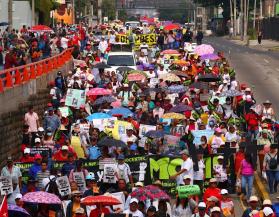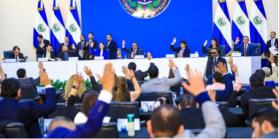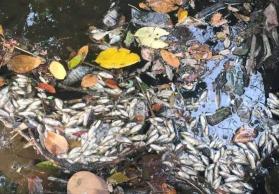El Salvador's 2014 Presidential Race Hits the US Early
Though Salvadorans will not hit the polls for another year and a half, their election season has begun in both El Salvador and the US. The two largest parties have named their presidential candidates: the leftist Farabundo Martí National Liberation Front (FMLN) will run the country’s current Vice-President, Salvador Sánchez Cerén and the right-wing Nationalist Republican Alliance (ARENA) will run the two-term San Salvador mayor, Norman Quijano. Both candidates have already caused a stir in the US: national media propagating falsehoods about Vice-President Sánchez Cerén and the Salvadoran immigrant community mobilizing against Quijano's visit California.
It's not unusual for the campaign to reach the US, with millions of Salvadorans living here; however, it is unusual for the campaign to reach the US so early. This fact underscores the importance of these elections, the first presidential vote since the FMLN ousted ARENA from their 20-year presidential run back in 2009.
For the next 17 months, the US will be an important electoral battleground for votes and political influence. In 2014, Salvadorans living abroad will be able to vote for their president by absentee ballot. According to the Minister of Foreign Relations, El Salvador’s Legislative Assembly is expected to approve legislation by the end of the year that will allow Salvadorans to vote by mail or through their consulates. Both parties will be hoping to win votes in the US.
As in every election since 1994, the ARENA party will also be looking to their influential US government contacts to offer political support. In 2004 and 2009, US Senators, Representatives and high-ranking cabinet members attempted to scare Salvadorans from voting for the FMLN, with empty threats of souring US relations, mass deportations and stopping the cash flow from family members abroad sent back to El Salvador in the case of an FMLN victory.
In both 2004 and 2009, the mainstream US media backed the US government-ARENA alliance to support the right-wing presidential bid. This summer, the US mainstream media began a similar defamation campaign against Sánchez Cerén. Both the Washington Post Editorial Board—considered to be the mouthpiece of the US State Department—as well as Wall Street Journal columnist and US intervention cheerleader Mary Anastasia O’Grady have falsely reported that Sánchez Cerén led a San Salvador rally on September 15, 2001 in celebration of the attacks on New York City's twin towers.
The 2001 rally they referenced was organized by student and youth organizations to protest the ARENA government’s annual militaristic celebration of Central American Independence Day, which is September 15th. The rally was planned weeks before the September 11 attacks occurred. A small group of students - who were not affiliated with Sánchez Cerén and the other FMLN leaders present - burned US flags . The Salvadoran mainstream media latched on to these images, vilifying Sánchez Cerén and the FMLN as anti-American and pro-terrorism despite the fact that Sánchez Cerén and the FMLN had publicly condemned the attacks on civilians and expressed solidarity with the families of the victims.
Perhaps most concerning is the behind-the-scenes anti-FMLN mobilizing already happening in the US based on these false claims. The Salvadoran Vice-President's fictional flag burning story somehow made it to the residents of a few small towns in Long Island, NY who mounted a small and unfocused protest against Sánchez Cerén's visits with local government officials, among a list of other complaints.
The recent campaign aimed at vilifying Sánchez Cerén foreshadows the manipulation and pressure that the US government will likely use to prevent or delegitimize an FMLN victory in 2014. In fact, some US officials are already clamoring to intervene in the FMLN-Funes Administration. In July, Republican Senators called on President Obama to stop US aid to El Salvador over a domestic Salvadoran political issue that did not concern US foreign policy in any form.
On the other side, ARENA's Norman Quijano has also been the target of much more effective and transparent community protest by Salvadorans in the US. In a September visit to Los Angeles, the ARENA mayor was met with community protest, denouncing him and the death-squad roots of the ARENA party. During the rest of his California tour, the Salvadoran community effectively pressured the mayors of Oakland and Elk Grove to cancel their meetings with the ARENA candidate, delivering a major diplomatic slap in the face to the Mayor of San Salvador.
The 2014 Candidates
Salvador Sánchez Cerén is a former school teacher and was a leader of the historic teacher’s union, ANDES 21 de Junio. During El Salvador’s Civil War he was a member of the FMLN’s General Command and was one of the negotiators and signers of the 1992 Peace Accords that put an end to the armed conflict. In 2009 he was elected Vice-President of the country and was also named Minister of Education by his running mate and the newly-elected President Mauricio Funes.
 As Minister of Education, he launched some of the highest-rated social programs of the Funes administration, including: the National Literacy Program; the Glass of Milk and School Meal program which provides free meals and milk to public school students; the School Uniform and Supplies program which provides two free uniforms, a pair of shoes, and supplies to all public school students; as well as administrative reforms to provide on-going training and better work conditions for public school teachers.
As Minister of Education, he launched some of the highest-rated social programs of the Funes administration, including: the National Literacy Program; the Glass of Milk and School Meal program which provides free meals and milk to public school students; the School Uniform and Supplies program which provides two free uniforms, a pair of shoes, and supplies to all public school students; as well as administrative reforms to provide on-going training and better work conditions for public school teachers.
Support for other possible FMLN candidates has been framed by the mainstream media as a sign of greater internal party division than actually exists. While differences of opinion have existed throughout the candidate selection process, at this point many local and national party leaders say that Sánchez Cerén’s candidacy has received wide support from the party membership, and they do not expect opposition to the ratification of his nomination at their National Convention in November. During consultations with the party’s rank-and-file members following the FMLN’s election losses last March, members spoke of disillusionment with President Funes’ centrist path and his distance from many solidly left FMLN positions. Sánchez Cerén’s proposed candidacy represents a reaffirmation of the party’s commitment to its founding principles of revolutionary socialism and participative democracy. Party leaders expect his candidacy to unite the FMLN’s base and to guarantee the continuation and expansion of the transformations that have begun during the Funes administration.
 Norman Quijano is a dentist by profession. He served five consecutive terms in the Legislative Assembly as part of ARENA’s fraction before being elected Mayor of San Salvador in 2009 and reelected in March of this year. While city beautification projects sponsored by private businesses have earned him a solid base of support from the capital’s middle and upper class, his municipal administration has also been characterized by violent evictions of street vendors, massive firings of municipal employees, and a refusal to cooperate with the central government even in road improvements and health campaigns for the capital. In Quijano’s first public appearance as presidential candidate, he criticized the School Uniform program as overspending—a criticism that has also been made by the International Monetary Fund (IMF)—and said his administration would do away with it.
Norman Quijano is a dentist by profession. He served five consecutive terms in the Legislative Assembly as part of ARENA’s fraction before being elected Mayor of San Salvador in 2009 and reelected in March of this year. While city beautification projects sponsored by private businesses have earned him a solid base of support from the capital’s middle and upper class, his municipal administration has also been characterized by violent evictions of street vendors, massive firings of municipal employees, and a refusal to cooperate with the central government even in road improvements and health campaigns for the capital. In Quijano’s first public appearance as presidential candidate, he criticized the School Uniform program as overspending—a criticism that has also been made by the International Monetary Fund (IMF)—and said his administration would do away with it.
The decision by the leadership of the ARENA party to propose him as candidate without any consideration of other possible candidates has caused significant internal division. In an interview in El Faro about ARENA’s nomination process, Eduardo Zablah, who held posts in three of the four ARENA presidencies, said, “There was a ruse of a campaign team to accelerate the process, close the doors as soon as possible and avoid any possibility of competition.” ARENA’s private sector membership and the party’s founders have also publicly denounced the process as rushed and manipulated.
Additional smaller parties have also announced plans to run presidential candidates. The Grand National Alliance party (GANA), formed by a group of ARENA dissidents led by ex-President Tony Saca (2004-09), announced in 2011 that Saca is their candidate. The centrist Democratic Change party has also announced plans to run a candidate, though they have not given any names. Other small parties could choose to run candidates or endorse another party’s candidate. The reality is that the FMLN and ARENA draw the vast majority of votes, making it near impossible for any other party candidate to win; however, a runoff election is likely.
The 2014 elections will be big. Since the historic 2009 victory of President Funes and Vice-President Sánchez Cerén, the social programs implemented by different FMLN-led ministries (particularly in Agriculture, Healthcare, and Education) have taken the first steps in the path towards social justice. An FMLN victory over ARENA in 2014 is crucial to the continuation and expansion of these transformative processes. Meanwhile, ARENA and their big business allies are desperate to take back the central government. The race is certain to be a long and heated, with the US campaign shaping up to be even more critical than in past presidential elections.

 "I am a CISPES supporter because continuing to fight for social justice and a more people-centered country means continuing the dream and sacrifice of thousands of my fellow Salvadorans who died for that vision.” - Padre Carlos, New York City
"I am a CISPES supporter because continuing to fight for social justice and a more people-centered country means continuing the dream and sacrifice of thousands of my fellow Salvadorans who died for that vision.” - Padre Carlos, New York City

